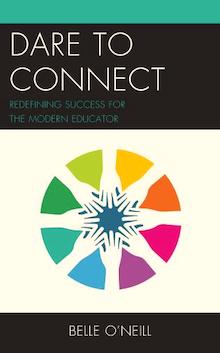Strive to Achieve the Six P’s of Professionalism
Belle O’Neill devoted three decades to classroom teaching before becoming a teacher educator in 2019. Her thoughts about professionalism may be of interest to pre-service and novice teachers.

By virtue of a degree, we are deemed professionals. We have passed the requisite classes and our student teaching. But now that we are in the actual classroom, how do we build relationships over time with our students, colleagues, parents, administration, and the community so they trust and work with us?
My 6 Ps of teacher professionalism are based on my 32 years experience as a classroom teacher. These are the qualities and attributes I feel are most vital to bringing meaning to your job, keeping educational goals at the forefront of your teaching, and keeping you from burning out.
I hope new and continuing teachers find something of lasting value here.
1. Be Present
The most important quality for a teacher is being present. When you are in the moment, you experience the joy and connection of teaching. You observe, listen, and adjust your teaching as you learn alongside your students.

From the moment the students arrive to when they leave the classroom, be there in the moment. Be at the door for every new student entering the classroom. Greet them by name at the door, smile, and look them in the eye. A big smile and asking how they are doing goes a long way. It shows you care about them as a person and not only as a student in your classroom.
Move around your classroom during class. Do not stay in the front of the room. You will be amazed how much is going on related and not related to content learning. Insist on clear aisles and backpacks underneath the desks so you can get to every desk and check on every student.
Start and end your class on time to demonstrate your learning experience runs bell to bell and education is a priority in your classroom.
2. Be Prepared
Always over-plan. Tight lesson plans prevent behavioral issues because students do not have time to misbehave. If you finish early, continue to the next day’s lesson plans so there is no dead space when the students have nothing to do.
Successful teaching is like successful cooking: have all necessary ingredients out before class. Put key points on the board or project from the computer to your screen. Make sure your technology is set up and ready to go. Pretend you are the student. Are your directions clear?
Be knowledgeable in your subject area. Be up on the latest information. When you know your subject matter, you have more tools in your box. You anticipate where students will struggle, teach your subject in logical and manageable chunks, and can reteach a lesson in a different way if students do not understand the original presentation.
Teach and practice with your students how to transition from one activity to the next. State in your syllabus that transitioning is always doing and never saying, unless students are specifically asked to talk. For example, “Open your book to page 10” means open your book without talking about your weekend plans.
Post grades in a timely fashion. An accountable teacher means more accountable students and fewer phone calls from parents.
3. Be Part of the Team
You need to follow school rules so there is consistency among the staff and less chance for students to find loopholes.
Avoid creating problems with the administration and other staff members. If you have concerns with school policies, talk directly with your administration, but don’t take it upon yourself to ignore the rules.
If you want to make a difference – if you want your teaching to stand out – do it within the rules. Your colleagues and administrators will be more likely to help you when you need help.
4. Be Positive
You are a role model for students and staff. What you say reveals more about you than the person you are talking about.
Sign up to help around the school and invest in your school community. Visit the students’ world outside of your classroom. See them as they act in the play, serve as the the drum major, strive as the football player.
Make your job more meaningful by reaching out and taking pride in your school community. Help around the school to avoid complacency and boredom. Mix it up so you have more to offer your students. When you are more interesting, they are more interested.
5. Be Proactive
Proactive is defined as acting in anticipation of future problems. Believing you are the leader and in charge of your classroom rather than only the facilitator can prevent many potential problems. You decide the arrangement, seating, and décor of your classroom. You have the right to change it at any time. If you want student input in these areas, it is at your discretion.
Self-reflection can make you more proactive the next time you teach the same lesson. Write directly in your lesson plan what went well and what did not. Reflection can result in more effective strategies for the class and thus help students learn in a more engaging manner next time.
6. Be Patient
Teaching takes a lot of patience. Assess if this is truly the career for you before you become committed for the long term. Observe teachers in their classrooms and interview them about their careers before deciding to major in education. Ask if you can assist them with an activity to get a feel for the job.
If you do decide to become a teacher, it will take time to build your expertise. You will have ups and downs where you may question your ability. But remember, the struggles are where you grow and improve your teaching. Find a positive mentor who can keep things in perspective and remind you to be patient with yourself. You will become an awesome teacher, but that will happen over time.
Not popularity or perfection
Notice the 6 Ps do not include popular or perfect. Your goal is to be respected and to guide students towards educational goals.
If a teacher sees themselves as a friend of the students, they are thinking of themselves first. How can they get the students to like them? That is not an educational goal, and the friend role could result in the students liking you on fun days, but when you try to teach on a different day, they may feel betrayed that their friend went away.
If a teacher sees perfection as the goal, they will be paralyzed because they will set out to reach unattainable goals or they will falsely believe once they have figured it all out, they can coast the rest of their career. You don’t get to coast in teaching.
These 6 criteria may be used as a checklist to establish connections and build your reputation throughout your career. Use these as a reference when you have issues. Use these principles to give you confidence when you must speak up for yourself.

Belle’s book, Dare to Connect: Redefining Success for the Modern Educator, was published by Rowman and Littlefield in 2021. Visit her author website and listen to her podcast Be That Teacher.





























